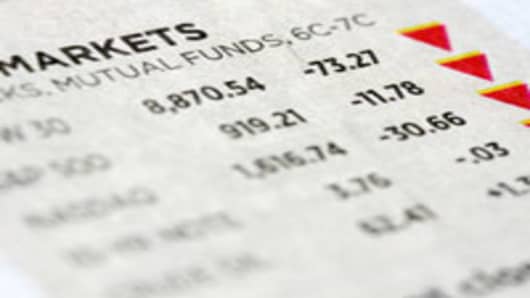While domestic equity funds, excluding exchange-traded funds, saw outflows of $2.056 billion, foreign funds saw inflows of $78 million, and emerging market funds saw $142 million in net inflows, according to Lipper data.
Bond funds, meanwhile, saw a net inflow of $2.3 billion as investors continued to seek the safety of debt—government and otherwise—despite its anemic yields.
And money market funds, which make for an even less profitable investment at virtually zero interest, saw inflows of $17.83 billion, pushing the money-on-the-sidelines figure to $2.83 trillion, according to the Investment Company Institute(Lipper data put the weekly inflows figure even higher at $18.45 billion).
The data reflects a continuing tug-of-war between market bears and bulls, with the bulls able to push the averages higher but the bears unwilling to put any faith in the market. Stocks looked for direction through most of Friday, moving slightly higher entering the final hours of trading.
"You almost get the feeling it's a big vote of 'no confidence' in the developed markets. People have bought the emerging-markets growth story," says Brian Gendreau, market strategist with Financial Network Investment Corp., based in El Segundo, Calif. "There are people out there thinking that 'all this pessimism is overdone, but I'm going to get off the tracks until the trains go by.'"
There is growing belief that investors have lost faith in a market that seems to have shed some of the stabilization it had found after the credit crisis.
Looming issues such as high unemployment that won't go away, uncertainty over European sovereign debt, and the integrity of the market after the May 6 flash crashcontinue to weigh on investors' minds.
The June funds data also could reflect investor fear after the market's May slide, in which $12.8 billion left equity funds for the entire month.
"Real people are nervous, they're worried. They didn't make all their money back (after the financial crisis)," says Kathy Boyle, president of Chapin Hill Advisors in New York. "You lose that much money in a month and it scares you."
The result, market watchers say, is that stocks could well go sidewise for a while until some greater catalyst comes along—surprises in earnings, a change in tax policy, or some clarity from Europe to name a few.



